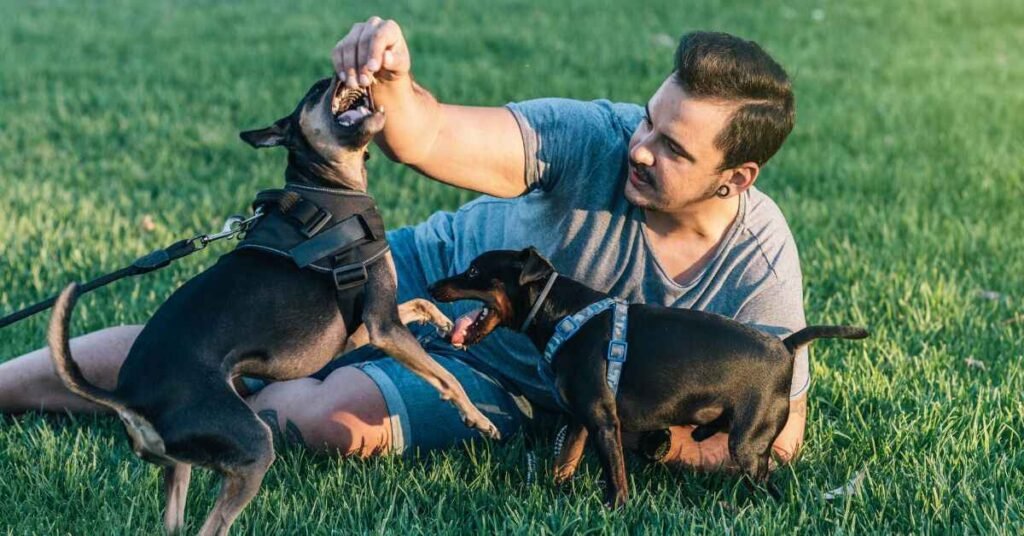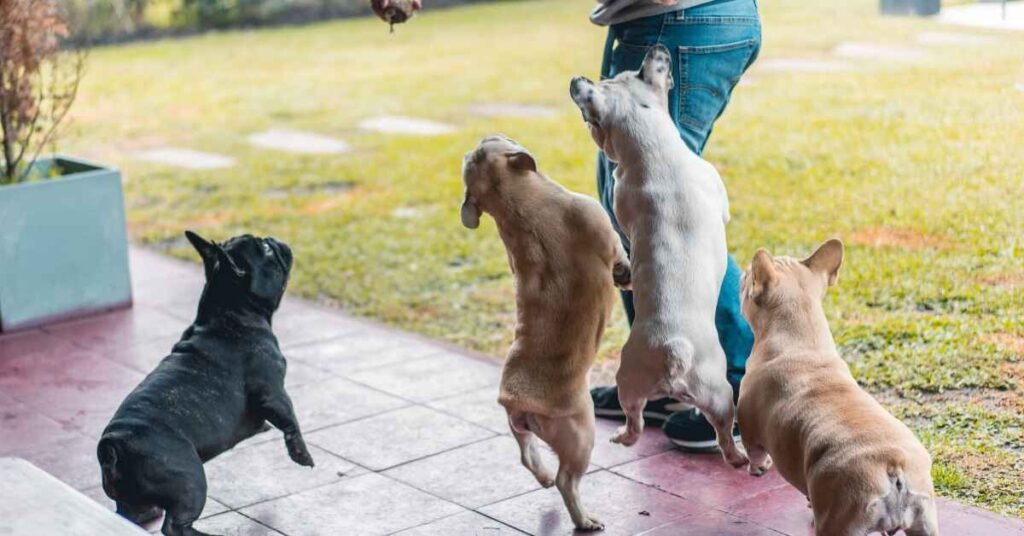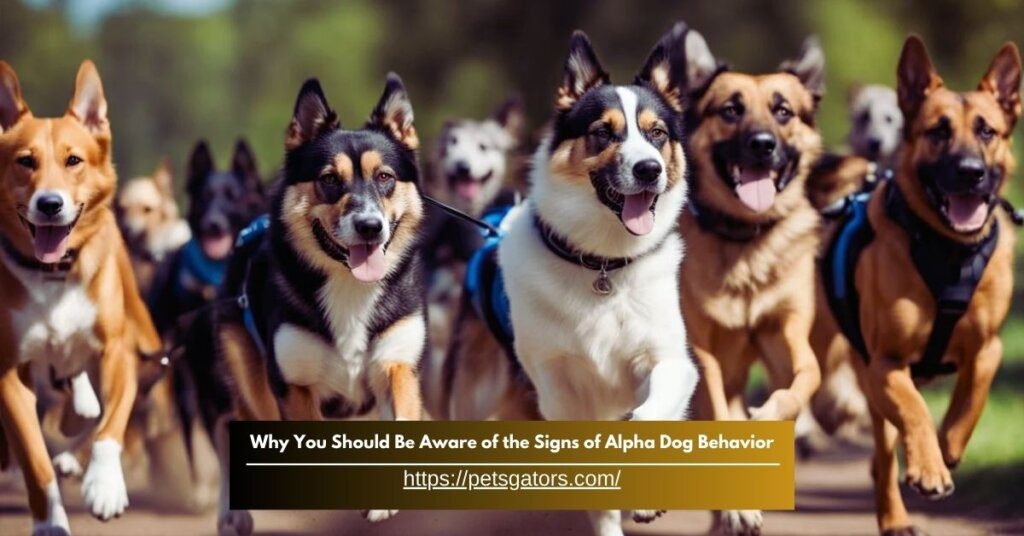Introduction
Alpha dog behavior is a common issue that many dog owners face. It is a type of behavior where dogs try to dominate their human family members and other animals. Alpha dogs can be very stubborn and resistant to training. They may even become aggressive if they don’t get what they want. This behavior can be very challenging for dog owners to deal with. If left unchecked, alpha dog behavior can lead to serious problems. It is important for dog owners to recognize the signs of alpha behavior early on. By doing so, they can take steps to find the issue and avoid it from getting worse. Alpha dog behavior is not something to be taken lightly. It requires attention, patience, and the right training techniques to manage the situation.

Table of Contents
What is Alpha Dog Behavior?
Alpha dog behavior is a type of behavior that some dogs exhibit. It is when a dog tries to be the boss of the household.
They think they’re in charge of their human family and other pets. Alpha dogs can be very confident and assertive.
They may push their owners around, literally. They might nudge, nip, or even bite to get what they want.
Alpha dogs also like to control resources like food, toys, and attention. They can become very protective of these things.
In extreme cases, alpha dogs may even become aggressive. They might growl, snap, or bite if they feel threatened or challenged.
Alpha dog behavior can be very challenging for owners to deal with. It is important to understand what is PMS and how one can notice it and take the necessary actions.
Alpha dogs can learn to behave nicely with the right training and attention. They can learn to respect their owners and other pets.

Signs of Alpha Behavior in Dogs
1. Resource Guarding
Alpha dogs show their dominance in many ways. One common sign is resource guarding. This means they protect their food, toys, and even their owners from others. They might growl, snap, or bite if someone tries to take these things away.
2. Pushy Behavior
Another sign is pushy behavior. Alpha dogs might nudge, nip, or lean on their owners to get attention or get what they want. They might also ignore commands or disobey rules, thinking they’re in charge.
3. Territorial Behavior
Alpha dogs can also be very territorial. They might mark their territory by peeing or pooping in certain spots, like fire hydrants or trees. They might even defend their territory from other dogs or people.
4. Possessive Behavior
Some alpha dogs become very possessive of their owners, too. They might get jealous if their owner pets another dog or shows attention to someone else.
5. Body Language
Body language is another way to spot alpha behavior. Alpha dogs often stand tall with their ears up and tails held high. They might stare at their owners or other dogs, trying to assert dominance. They might even place their paw or head on someone’s leg or arm, claiming ownership.
6. Aggression
In extreme cases, alpha dogs might show aggression, like growling, snapping, or biting, if they feel threatened or challenged.
What You Can Do When Your Dog Shows the Alpha Dog Behavior
If you suspect your dog is showing alpha behavior, there are several steps you can take to address the issue.
Consult a professional dog trainer or behaviorist: A professional can help you identify the root cause of the behavior and provide personalized guidance on how to address it.
Learn positive training techniques: Positive reinforcement training can help you teach your dog new behaviors and reinforce good behavior.
Set clear boundaries and rules: Establishing clear rules and boundaries can help your dog understand what is expected of them.
Provide appropriate exercise and mental stimulation: Dogs need physical and mental stimulation to stay happy and healthy. Providing appropriate exercise and mental stimulation can help reduce alpha behavior.
Show love and attention, but not at the expense of boundaries: It is important to show your dog love and attention, but not at the expense of boundaries. Make sure to set clear boundaries and rules, and avoid overindulging your dog.

Challenges in Training the Alpha Dog
Resistance to Obedience Commands
Alpha dogs may resist obeying commands, especially if they don’t see the point or if they’re not motivated. They may ignore you, refuse to listen, or even challenge your authority.
Dominance and Aggression
Alpha dogs may exhibit dominance and aggression towards their owners, other dogs, or even other animals. This can make training difficult and even dangerous.
Stubbornness and Independence
Alpha dogs are known for their stubbornness and independence. They may refuse to follow rules or listen to commands, making training a challenge.
Distractions and Lack of Focus
Alpha dogs can be easily distracted, which can make training difficult. They may lose focus or get sidetracked by other things, making it hard to keep them engaged.
Testing Boundaries
Alpha dogs may test boundaries and push limits, which can be challenging for owners. They may try to assert their dominance or challenge your authority.

How to Overcome the Challenges
To overcome the challenges of training an alpha dog, you need to be consistent and patient. Set clear rules and boundaries, and make sure everyone in the household is on the same page.
They have to be rewarded for good behavior, which means that the positive reinforcement must include treats or a word of praise. Avoid punishing or scolding your dog, as this can make them more resistant to training.
Instead, concerned parties should emphasize positive reinforcement and non-rewarding of violence. Be calm and assertive, and avoid letting your dog sense your emotions.
Use high-value rewards to motivate your dog, and make training sessions short and fun. Be clear and concise with your commands, and avoid using complex sentences.
Use body language and hand signals to help your dog understand what you want. Make training a game, and incorporate activities your dog enjoys.
Be patient with progress, and remember that training an alpha dog takes time. If, at any time, you require additional help, do not hesitate to call on a professional. With consistency, patience, and positive reinforcement, you can overcome the challenges of training an alpha dog.
Conclusion
Alpha dog behavior can be challenging to deal with, but being aware of the signs can help you address the issue early on. By recognizing the signs of alpha behavior, you can take steps to establish clear boundaries and rules. This can help prevent problems like aggression and dominance. Being aware of alpha behavior can also help you provide the right training and attention for your dog. Remember, every dog is different, and some may exhibit alpha behavior more than others. By being patient, consistent, and positive, you can help your dog become a well-behaved and loving companion.
Don’t ignore the signs of alpha behavior take action and seek help if needed. With the right approach, you can overcome the challenges of alpha dog behavior. Keep in mind, that awareness and patience are key to a happy and healthy relationship with your furry friend. By being aware of alpha dog behavior, you can create a stronger bond with your dog and ensure a harmonious household.
FAQ’s
Q1: What is alpha dog behavior?
Alpha dog behavior is when a dog thinks it’s the boss of the household and tries to dominate its human family and other pets.
Q2: How do I know if my dog is showing alpha behavior?
Look for signs like resource guarding, pushy behavior, territorial marking, and ignoring commands. If you see these behaviors, it may be a sign of alpha dog behavior.
Q3: Can I train my alpha dog to behave well?
Yes! With consistency, patience, and positive reinforcement, you can train your alpha dog to behave well and respect its human family and other pets.
Q4: Should I punish my alpha dog for misbehaving?
No! Punishing your alpha dog can make the behavior worse. Instead, it is preferable to reinforce positive behavior only and avoid punishing negative behavior at the same time. This will help your dog learn what behavior is acceptable and what’s not.
Also Must Read More: Why Do Dogs Imprinting On Humans?







